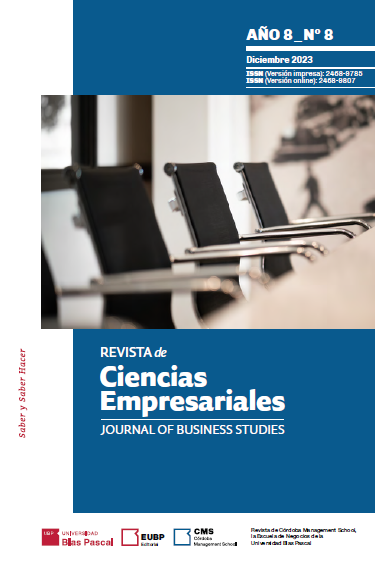Associative networks for the daily prediction of opening and closing values of stock indices
Redes asociativas para la predicción diaria de los valores de apertura y cierre de los índices bursátiles
DOI:
https://doi.org/10.37767/2468-9785(2023)004Palabras clave:
associative neural network, LSTM, time series, index, prices, red neuronal asociativa, series temporales, índice, preciosResumen
Abstract
This paper presents an associative neural network based on Long Short-Term Memory (LSTM) networks to predict the opening, minimum, maximum and closing prices of the Shanghai composite index, PetroChina Company Limited (PetroChina), and Zhongxing Telecommunications Equipment Corporation (ZTE). The data is transformed with time series techniques to render them stationary. Once good results are obtained in terms of the mean absolute percentage error (MAPE), the model is tested with the American Nasdaq Composite Index (IXIC). Similar works have been carried out, such as that of Ding & Qin (2020) where they predict the opening, minimum and maximum prices of an asset. This study goes a step further to predict the closing value following the proposed associative network methodology. Having the opening price and the closing price, it is possible to make investments to generate profitability based on the daily net change in value of the asset.
Resumen
Este trabajo presenta una red neuronal asociativa basada en redes LSTM (Long Short-Term Memory) para predecir los precios de apertura, mínimo, máximo y cierre del índice compuesto de Shanghai, PetroChina y Zhongxing Telecommunications Equipment Corporation (ZTE). Los datos son transformados con técnicas de series temporales para hacerlos estacionarios. Una vez obtenidos buenos resultados en términos del error porcentual absoluto medio (MAPE), el modelo es probado con el American Nasdaq Composite Index (IXIC). Trabajos similares han sido realizados, como el de Ding & Qin (2020), donde predicen los precios de apertura, mínimos y máximos de un activo. Este studio va un paso más adelante en la predicción del valor de cierre siguiendo la metodología de redes asociativas propuesta. Teniendo el precio de apertura y el precio de cierre, es posible realizar inversiones para generar rentabilidad en base al cambio neto diario en valor del activo.
Referencias
Almehmadi, A. (2021). COVID-19 pandemic data predict the stock market. Computer Systems Science and Engineering, 36(3), 451–460.
Bao, W., Yue, J., & Rao, Y. (2017). A deep learning framework for financial time series using stacked autoencoders and long-short term memory. PloS One, 12(7), e0180944.
Carta, S. M., Consoli, S., Piras, L., Podda, A. S., & Recupero, D. R. (2021). Explainable machine learning exploiting news and domain-specific lexicon for stock market forecasting. IEEE Access: Practical Innovations, Open Solutions, 9, 30193–30205.
Demi̇rel, U., Çam, H., & Ünlü, R. (2020). Predicting stock prices using machine learning methods and deep learning algorithms: The sample of the Istanbul Stock Exchange. GAZI UNIVERSITY JOURNAL OF SCIENCE. https://doi.org/10.35378/gujs.679103
Ding, G., & Qin, L. (2020). Study on the prediction of stock price based on the associated network model of LSTM. International Journal of Machine Learning and Cybernetics, 11(6), 1307–1317.
Evans, L., Owda, M., Crockett, K., & Fernandez Vilas, A. (2021). Credibility assessment of financial stock tweets. Expert Systems with Applications, 168(114351), 114351.
Haq, A. U., Zeb, A., Lei, Z., & Zhang, D. (2021). Forecasting daily stock trend using multi-filter feature selection and deep learning. Expert Systems with Applications, 168(114444), 114444.
Harel, A., & Harpaz, G. (2021). Forecasting stock prices. International Review of Economics & Finance, 73, 249–256.
Huang, S.-C., Wu, C.-F., Chiou, C.-C., & Lin, M.-C. (2021). Intelligent FinTech data mining by advanced deep learning approaches. Computational Economics. https://doi.org/10.1007/s10614-021-10118-5
Javed Awan, M., Shafry Mohd Rahim, M., Nobanee, H., Munawar, A., Yasin, A., & Mohd Zain Azlanmz, A. (2021). Social media and stock market prediction: A big data approach. Computers, Materials & Continua, 67(2), 2569–2583.
Khattak, A. M., Ullah, H., Khalid, H. A., Habib, A., Asghar, M. Z., & Kundi, F. M. (2019). Stock market trend prediction using supervised learning. Proceedings of the Tenth International Symposium on Information and Communication Technology - SoICT 2019. the Tenth International Symposium, Hanoi, Ha Long Bay, Viet Nam. https://doi.org/10.1145/3368926.3369680
Kohli, P. P. S., Zargar, S., Arora, S., & Gupta, P. (2019). Stock prediction using machine learning algorithms. In Advances in Intelligent Systems and Computing (pp. 405–414). Springer Singapore.
Mehta, P., Pandya, S., & Kotecha, K. (2021). Harvesting social media sentiment analysis to enhance stock market prediction using deep learning. PeerJ. Computer Science, 7, e476.
Nabipour, M., Nayyeri, P., Jabani, H., Shahab, & Mosavi, A. (2020). Predicting stock market trends using machine learning and deep learning algorithms via continuous and binary data; A comparative analysis. IEEE Access: Practical Innovations, Open Solutions, 8, 150199–150212.
Nti, I. K., Adekoya, A. F., & Weyori, B. A. (2020). A comprehensive evaluation of ensemble learning for stock-market prediction. Journal of Big Data, 7(1). https://doi.org/10.1186/s40537-020-00299-5
Nti, I. K., Adekoya, A. F., & Weyori, B. A. (2021). A novel multi-source information-fusion predictive framework based on deep neural networks for accuracy enhancement in stock market prediction. Journal of Big Data, 8(1). https://doi.org/10.1186/s40537-020-00400-y
Wang, C., & Bai, X. (2018). Boosting learning algorithm for stock price forecasting. IOP Conference Series. Materials Science and Engineering, 322, 052053.
Wu, D., Wang, X., & Wu, S. (2021). A Hybrid Method Based on Extreme Learning Machine and Wavelet Transform Denoising for Stock Prediction. Entropy , 23(4). https://doi.org/10.3390/e23040440
Wu, Y.-P., Mao, J.-M., & Li, W.-F. (2018). Predication of Futures Market by Using Boosting Algorithm. In 2018 International Conference on Wireless Communications, Signal Processing and Networking (WiSPNET). https://doi.org/10.1109/wispnet.2018.8538586
Zhang, C., & Bai, Y. (2019, December). Chinese A share stock ranking with machine learning apporach. 2019 6th International Conference on Information Science and Control Engineering (ICISCE). 2019 6th International Conference on Information Science and Control Engineering (ICISCE), Shanghai, China. https://doi.org/10.1109/icisce48695.2019.00047
Publicado
Número
Sección
Licencia
Derechos de autor 2024 Revista de Ciencias Empresariales │Universidad Blas Pascal

Esta obra está bajo una licencia internacional Creative Commons Atribución-NoComercial-CompartirIgual 4.0.










